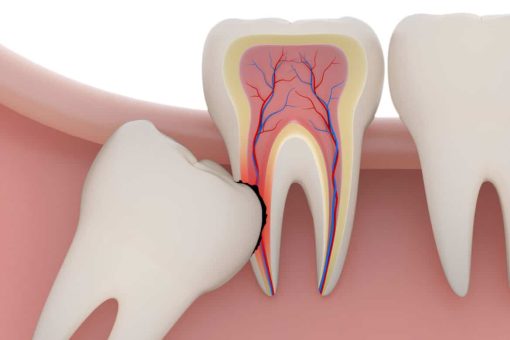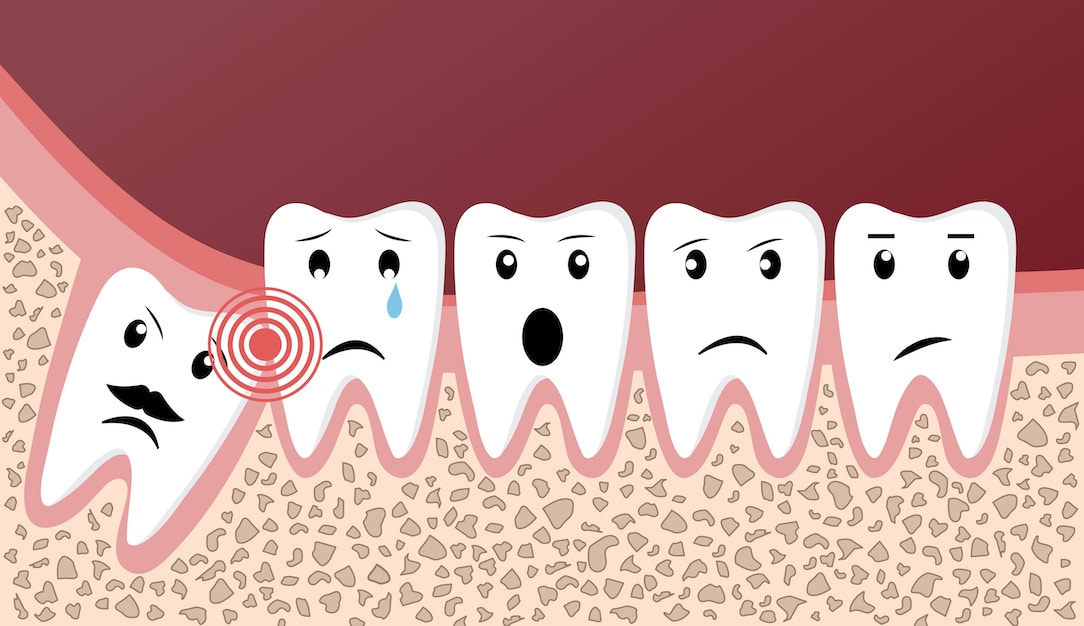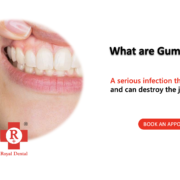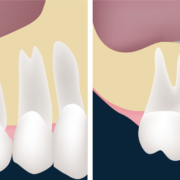Wisdom teeth are the last set of molars that usually develop during the late teen years and can cause a great deal of discomfort when they start to emerge. On average, these come in around the age of 17-25 years old, but the exact timing can vary greatly from person to person. While some people may never have to deal with wisdom teeth at all, others may start to experience pain and swelling in their late teens or early twenties when these start to come in. It is important to be aware of the signs and symptoms that could indicate that your third molar teeth are developing so that you can take the necessary steps.
What are wisdom teeth?
Wisdom teeth, also known as third molars, are the last of the adult teeth to erupt. They usually erupt between the ages of 17 and 25. But the exact timing can vary greatly from person to person. Third molar can be difficult to deal with, and may cause pain, swelling, and other issues if they are not removed. In some cases, these may be impacted, meaning they are stuck in the jaw and cannot erupt properly.

The primary function of wisdom teeth is to help with chewing. But since our diets have changed over time, these extra teeth are no longer necessary. In fact, many people have their last teeth removed to prevent potential problems down the line.
On average, when do wisdom teeth come in?
Wisdom teeth are the third and final set of molars that usually develop during the late teen years. On average, wisdom teeth come in around the age of 17-25 years old. But the exact timing can vary greatly from person to person. While some people may never have to deal with last teeth at all. Others may start to experience pain and swelling in their late teens or early twenties when their last teeth start to come in. It is important to be aware of the signs and symptoms that could indicate that your wisdom teeth are developing so that you can take the necessary steps to ensure your comfort and safety.
Signs and symptoms of wisdom teeth coming in?
The signs and symptoms of molar teeth coming in can vary from person to person. But some of the most common include pain or swelling in the back of the mouth, jaw pain, headaches, and bad breath. Other signs and symptoms may include difficulty opening your mouth, difficulty chewing, and a bad taste in the back of your mouth.
It is important to be aware of the signs and symptoms of wisdom teeth coming in so that you can be aware of any potential problems and take the necessary steps to ensure your comfort and safety. If you experience any of the above symptoms, it is important to contact your dentist to get a professional opinion.
How can you tell if your wisdom teeth are impacted?
Impacted last teeth are those that are stuck in the jaw and cannot erupt properly. They can cause a great deal of discomfort and can lead to other health issues if not treated properly. In order to determine whether or not your wisdom teeth are impacted. Your dentist will need to take x-rays of the area and perform a physical examination.
The x-rays will show whether or not the wisdom teeth are in the proper position and the physical examination will allow your dentist to assess the size and shape of the teeth. If your wisdom teeth are impacted, your dentist may recommend a variety of treatments, including extraction, orthodontics, or other procedures.
What are the risks associated with wisdom teeth?
Having wisdom teeth can lead to a variety of potential health issues, including pain and swelling, infection, cysts, and damage to adjacent teeth. Additionally, wisdom teeth can cause crowding and misalignment of other teeth, which can lead to dental issues such as cavities and gum disease.
For these reasons, it is important to be aware of the signs and symptoms of molar teeth coming in so that you can take the necessary steps to ensure your comfort and safety. If you experience any of the above symptoms, it is important to contact your dentist to get a professional opinion.
What are the treatments available for wisdom teeth?
The most common treatment for third molar teeth is extraction. This is a procedure that involves removing the wisdom teeth from the mouth. Wisdom teeth extraction can be done in an oral surgeon’s office or at a hospital and usually requires a local or general anaesthetic.

Other treatments may include orthodontic treatments to help reposition the wisdom teeth and prevent crowding or misalignment of other teeth. Additionally, medications such as anti-inflammatories or antibiotics may be prescribed to reduce pain and swelling.
How can you prevent wisdom teeth pain and swelling?
The best way to prevent wisdom teeth pain and swelling is to be aware of the signs and symptoms of wisdom teeth coming in and to take the necessary steps to ensure your comfort and safety. It is important to practice good oral hygiene, including brushing and flossing twice a day and visiting the dentist regularly. Additionally, it is important to avoid sugary and acidic foods and drinks, as these can cause tooth decay.
Finally, if you experience any pain or swelling in the back of your mouth. It is important to contact your dentist to get a professional opinion. Your dentist may recommend a variety of treatments, including extraction, orthodontics, or other procedures.
What are the benefits of Early Wisdom Teeth Removal?
There are several benefits to having your third molar teeth removed at an early age. One benefit is that it may reduce the risk of potential health issues, such as infection and cysts. Additionally, early removal may reduce the risk of crowding and misalignment of other teeth. Which can lead to dental issues such as cavities and gum disease. Early removal can also reduce the amount of discomfort and pain associated with wisdom teeth coming in. By having your molar teeth removed early. You may be able to avoid the need for more extensive treatments down the line.
What are alternatives to Wisdom Teeth Removal?
In some cases, wisdom teeth may be able to be treated without extraction. For example, orthodontic treatments to help reposition the wisdom teeth and prevent crowding or misalignment of other teeth may be recommended. Additionally, medications such as anti-inflammatories or antibiotics may be prescribed to reduce pain and swelling.
It is important to talk to your dentist about your options and the potential risks and benefits of each treatment. In some cases, extraction may still be the best option. But your dentist can help you make the best decision for your specific situation.
Conclusion
Last teeth are the third and final set of molars that usually develop during the late teen years. On average, third molar teeth come in around the age of 17-25 years old. But the exact timing can vary greatly from person to person. While some people may never have to deal with wisdom teeth at all. Others may start to experience pain and swelling in their late teens or early twenties when their last teeth start to come in. Ultimately, it is important to be aware of the signs and symptoms of wisdom teeth coming in so that you can take the necessary steps to ensure your comfort and safety.






